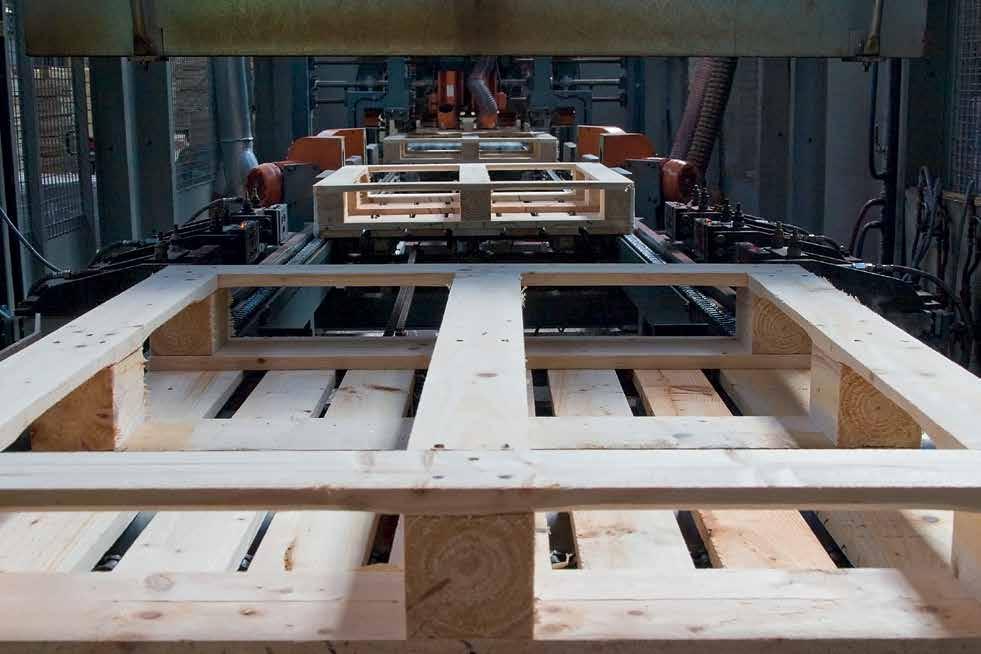WOODLAND CREATION
Pressing the button on multi-purpose forestry CASE STUDY
C
rofthead feels like the missing piece of a forest jigsaw: in a valley between spruce-covered hills (being harvested and restructured), surrounded by old riparian woodland and undermanaged farm woodlands. The sheltered, temperate climate is there; the woodland ecology is waiting to move in; and the timber extraction routes are in place. Or Crofthead might be more of a button: being pressed to draw the landscape into the twenty-first century, employing dynamic silviculture to tackle big challenges: resilient forests which rapidly sequester carbon to supply renewable, low-carbon resources. At 18 months old, the site is already visibly ‘enriching’ in nature, but this is no rewilding project. The diversity and speed of woodland creation at Crofthead is thanks to four human interventions. First, species choice. Oak, cherry and hornbeam in a productive mix. Norway spruce to encourage Douglas fir to root firmly. Amphibious red alder giving a hand to spruce in the wet clay. Mimicking Pacific Northwest forests, aspen mingled with conifers to bind soil and fix nitrogen like a farm ‘cover crop’ between harvests.
Second, quality stock. Cherry bred for timber, quite distinct from branchy, fragile fruiting varieties. Oak and Douglas from three provenances – Scotland, England and France – Andrew McQueen, Tilhill (left) and Richard Davidson (right) with one of the new oaks planted for timber at Crofthead mingled across the site for climate resilience, and marked in sample plots so that the most successful can be monitored. Improved Scottish birch from Future Trees Trust, already above our heads, competing with improved birch of Scandinavia. Third, a strong management regime. Professional wildlife management, including for grey squirrels. Short tubes on semiproductive broadleaves will be pushed up as trees grow, to encourage wind resistance. Pruning and subsequently thinning will ensure the productive broadleaves produce quality timber. Fourth, a clear business plan. The fastergrowing conifers will yield regular income to fund management of the Oak and slower growing species into the next generation. While unmanaged broadleaf becomes a liability, a well-managed one begins to grow in value, so that although some timber may not come to market for over a century, the land itself will have a growing timber, carbon and amenity asset value which can be bought and sold.
Andrew Macqueen, Tilhill (left) and Richard Davidson (right) with one of the new oaks planted for timber at Crofthead The real secret to Crofthead is the partnership between Richard Davidson and Andrew Macqueen, who pooled their silowner vicultural and business knowledge and experience, and passion for trees, to create a hobby woodland, a timber plantation, a biodiversity habitat, and a carbon sink, all from the same trees. Newsworthy heroic tree planting feats are often either epic solo efforts, or mighty national collaborations. But perhaps in the UK, while there is ample scope for new forestry investment models, the ‘breadand-butter’ of the modern, multi-purpose forest will be the creative, efficient, and human owner-manager double-act.
CROFTHEAD FACTS AND FIGURES Crofthead
Location: Dumfries & Galloway, near Moffat
BRN:163453 MLC:75/326/0133 Scheme boundary
Area: 54ha
Access point
powerline
Owner: Richard Davidson
archaeology2
Species SS
Manager: Andrew Macqueen, Tilhill
MC MB/MC
Planted: 2018
MB PMB
Composition: 4.5% productive broadleaf 31.5% Sitka spruce (some in mixture) 9.5% pure mixed conifer 17.5% semi-productive broadleaf 20% mixed conifer/broadleaf 17% open space
OG watercourses
© Crown copyright and database rights 2017 Ordnance Survey AL100018344
Scale 1:5,000
0
CONFOR.ORG.UK
95
190
380
570
760 Meters
OS sheets: NT10NW contours NT10SW contours NT10NW NT10SW
03/05/2017
Carlow House Locharbriggs Dumfries DG1 1QS Tel: 01387 711211 Fax: 01387 711212
FORESTRY & TIMBER NEWS • December 2019 67























